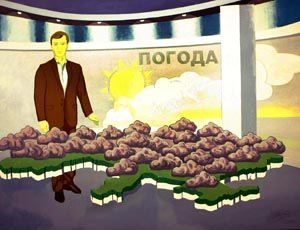Cosmonautics Day. Hm, what on earth is that?

Two events chanced to coincide on one day. The first was a game between two soccer teams, from Donetsk and Spain. The other was Cosmonautics Day. Russia celebrated it with great pomp, whereas Ukraine, with its history of space exploration, got away with a handful of official events, the head of state with congratulations and expression of good wishes: in Dnipropetrovsk, the aerospace capital of the nation; the governor, head of oblast legislature, mayor, and others — with greetings from billboards. There doesn’t seem to be any obvious connection between a so-so soccer match for Shakhtar, Donetsk, and the space flight of Yurii Gagarin. Yet it turns out that the connection does exist, and it is a direct one.
There were still a couple of minutes left before my Kyiv-bound train departed when I overheard a conversation between two train attendants. One of the ladies was probably in her late forties, the other might be twice as young. The younger one asked, “Do you happen to know the soccer score?” “No idea. By the way, today’s a holiday.” “A holiday? What holiday?” “Cosmonautics Day.” “What on earth is that? Why is it a holiday?”
We can be distressed for the umpteenth time at the ignorance and lack of interest of young people. They do not know Soviet holidays, and the more knowledgeable generation is slowly going away. To a certain extent, this is the case. Yet the reasons for an overall cultural degradation lie in the intellectual state of the nation’s elite. At least, of those who consider themselves to be elite, albeit without any special grounds.
Recently at a talk show in Dnipropetrovsk a local municipal council, head of one of commissions, mistook Marshak for Mayakovsky. No wonder, both poets’ names begin with the same letter. The guy wanted to make a brilliant display of his erudition but made a blooper instead. Meanwhile, a very important problem in the city’s cultural life was being discussed, the fate of the House of Organ Music and Ukraine’s best organ. It is people with this sort of intellect who consider themselves to have the right to decide on such complicated cultural (and political, if you wish) issues. And it is a political issue, as it falls beneath cultural policy. Fortunately for the guy, the episode was cut off the televised version and his reputation was saved.
Suffice it to listen to our MPs – how anxious they are to put in a witty word or smart quotation! What sophisticated airs they put on as they cite the classics and great men of the past! Recently on Savik Shuster Live one such connoisseur from the Lytvyn bloc put in a quote by Churchill (at least this was what he took it to be) saying that Stalin got Russia with a wooden plow and left it with a nuclear bomb. I did wish someone had helped this poor devil and told him that although the British prime minister was a great man, he never uttered anything like this. The phrase belongs to a renowned Trotskyite, author of one of the first political biographies of Trotsky, Isaac Deutscher. But what self-admiration! However, as traditional wisdom goes, all that glitters is not gold… You can be filthy rich, but inner culture and education cannot be bought.
Still, misquoted quotes are by far not the worst thing. Once two MPs were engaged in a serious discussion about what NABUCCO stands for. The esteemed parliamentarians were literally appalled to hear that it is the name of an opera by Giuseppe Verdi, relating a Biblical story, while Nabucco is an abbreviated Italian interpretation of the name of Nebuchadnezzar, king of Babylon. And how Verdi’s opera connects to the gas pipe from the Caspian region and Central Asia to Europe was totally beyond their comprehension. This was a problem where history, geography, geopolitics, and logical thinking overlapped. The poor guys just stared blankly when they heard the names Verdi and Nebuchadnezzar. Trying to explain something to them was as helpful as banging your head against a brick wall.
Degradation, first and foremost in culture and education, is obvious. And it is our elite that it starts with. This “elite” is now largely made up of individuals who have never read a book; moreover, they even boast they will never read one; and to crown it all, they are barely literate.
Thomas Edison, the great inventor, would hire a candidate only after a personal interview, in which technical issues were discussed. But before that an applicant had to fill out quite a long questionnaire. It would include questions like where the Volga flows and what it empties into. Or who Leo Tolstoy is and what he wrote. Edison sent one of his first phonographs as a present to Yasnaya Polyana. If a candidate failed to answer 90 percent of questions, he would not be granted an interview with the great inventor. Answering the questions of his assistants, Edison explained, “I don’t need engineers or physicists with a narrow outlook and poor education. Individuals with a low level of culture are incapable of thinking broad.” By the way, the famous Nikola Tesla did have trouble filling out Edison’s questionnaire, but he always supported this rule.
Camillo Cavour, first prime minister of the newly united Italy, once said, “We have created Italy, now we have to create Italians [in fact this is a quote of Massimo d’Azeglio, a major Italian statesman and mentor to Cavour – Ed.].” And this was said in a country with a rich culture of the past and present, and with an elite which was aware of its role in the historical process. This is a worthy example. Let us follow it, and Cosmonautics Day will be remembered.






